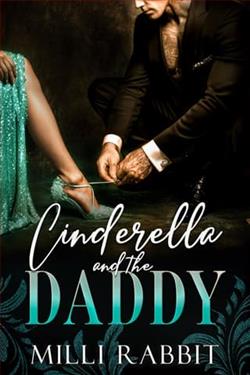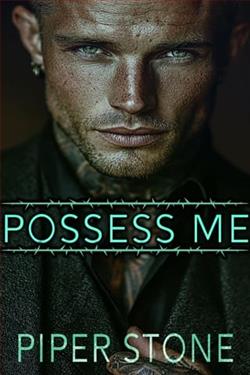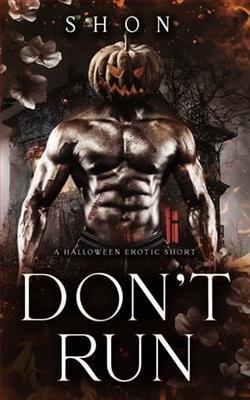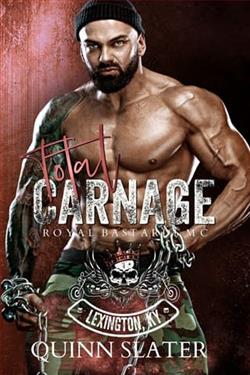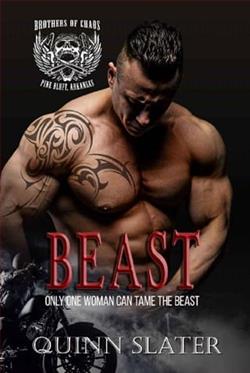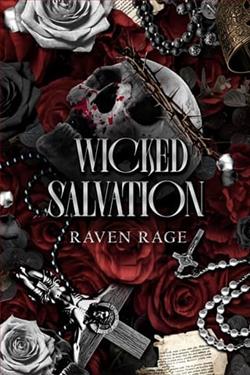Page 4 of Welcome to Blackbird Hollow
I lean out the window, ready to wheedle a little. “You know I prefer a cobbler—with the crumble top. And vanilla ice cream.”
“Freshly churned, no doubt,” Widow Harkness replies with an arch of her eyebrow.
I grin for real this time.
She shakes her head. “Classic Wyatt Hayes.” I snicker, and she makes the usual witch’s hand motion to remind me that she sees all as I pull away, shouting after me, “Come by this afternoon. I’ll be home.”
Widow’s voice fades away as I take the sharp turn up the switchback onto the familiar gravel of Blackbird Road. Fernwhines when we pass our house, but only a little, like she’s just saying hi to her food bowl. She leans against me, her giant head resting on my shoulder.
“Fallon’ll get you something to eat,” I promise her.
Fern growls a little in response, but it’s a chatty noise, not a warning. Fallon is one of the few people the canine trusts. I take a right turn at the old mailbox shaped like a trout. Its mouth’s gaping open for all the world to see. The monstrosity is at odds with the elegant loops of the wrought-iron gate. This far up in the hills, mist hangs everywhere, and though there are clusters of gold-leafed birches, the old place is fully in the pines.
The drapes of the rickety old Victorian are all thrown open, so I know my sister hasn’t just slept in. Not that Fallon sleeps much to begin with. Fern tumbles out of the truck ahead of me when I open the door, shooting off after a squirrel. I head onto the porch and push open the kitchen door, calling out for Fallon.
She doesn’t answer, but the coffee in the pot is still warm, though there’s barely enough for me to have a cup. My heart slows, its thump all I hear as I stare at the kitchen stairs. They’re painted a shade of light blue that feels like childhood. It was the first thing we did when we moved here. Paint was all we could afford, so we paintedeverything.
Just me, Caden, and Fallon.
I was twelve, Fallon thirteen, and Caden five. We weren’t old enough to be alone by today’s standards, but things were chaotic back then. Technically, we were fifteen years into Reformation, but shit was still wild. There weren’t even public utilities out here ’til the tribe turned them on for us. We spent the first few weeks in the dark, since Fallon didn’t know enough to fill out the right paperwork.
She figured things out, though. We all did. A familiar pit opens up in my gut. I try swallowing it down. Hoping it’ll just go away—that the memories will all just stay put.
My heart beats slower, thumping hard as I call out Fallon’s name again.Where the hell is she?Childhood panic takes over; a memory of coming downstairs one winter morning to a cold, empty kitchen and a fresh blanket of snow in the garden. Caden was sick, and Fallon was nowhere to be found. Her footprints went into the woods, but none came out.
I steady myself against the big old fridge, letting its familiar whirring hum wash over me. She’d just been out then, and she’s probably just out now. I close my eyes, waiting for the panic to subside. It took years to get these episodes under control, but I’m better at it than I used to be.
Outside, Fern barks, bringing me out of the past. “You monster!” Fallon squeals. “Puppy paw prints all over my gown!”
Relief floods through me, a flush of heat inflaming my cheeks. I try to keep my footsteps slow, but I rush for the back door, almost knocking over the umbrella stand in the mudroom. The door flies open, but I barely remember touching it.
Fallon’s in the garden, dressed only in a pair of wellies, a thin white nightgown, and a genuine Cowichan sweater our dad got years ago for bringing the Coast Salish a collection of banned books for their massive library. It’s got orcas on it, and it’s one of Fallon’s favorite sweaters.
My sister looks just exactly like our mom. Long, dark brown hair. Tall, but not willowy.Built like a volleyball player.That’s what our dad always said.Strong and long. And pretty enough to get herself into trouble. But unlike our mom, Fallon is covered in tattoos. And now paw prints. Fern leans against her thigh, grinning like a fool while Fallon scratches under her chin.
She looks up at the porch, her brows knitting under her messy bangs. “Why’re you so pale?”
I shake my head, not able to speak just yet. That’s when I notice the bruise purpling on my sister’s left cheek. “We weresupposed to meet an hour ago,” I blurt out. “What the fuck have you been up to, Fallon Hayes?”
My infuriating sibling just holds up the basket she’s got propped on her hip and grins. “Picking the last of the cherry tomatoes. Want an omelet?”
Chapter 3
Alice
“What do I have to lose?” I ask Habib, even though my hands are shaking above the keyboard. I mean, I’ve been expelled. I’m probably blacklisted at every graduate program worth attending. I can’t go home—my parents took the landlord’s enormous buyout to give up their rent-controlled apartment last year. And Angelica Wallingford, Aston’s mother, already told me she’d do her best to poison any standing in the scientific community I have left.
“Habib,” I say, gently extracting the cat from my sweater. He’s still sleepy, back legs hanging limp. I give him a kiss on his forehead. “I gotta go, buddy. Thanks for the cuddles.”
But I still hold him against my chest as I finish clearing my browser history and make sure I’ve logged out of everything. Then I stand, curling one arm around his little body, and gather up my things. I set him down on the seat of my chair—still warm, no doubt, which hopefully he appreciates. He curls up in an instant, looking like a creamsicle-swirl ice cream cone from old-timey photos of oceanside boardwalks. The ones that used to line the coasts, before all the climate change ravaged seaside communities.
Amir bustles by with a bin of used mugs, reaching for mine. I open my mouth to tell him I’m leaving and that I’ll probably never see him again. But then I remember that’s exactly what he’s always expected of me—to stay for a few years and inevitably disappear back to wherever I came from. So, instead, I just zip up my jacket and sling my backpack over my shoulders.
“See ya, Amir,” I say. He responds with something brief and noncommittal, and then I’m off, slipping out into the dark autumn evening.
It’s only a few blocks to my apartment, and I keep my head down, eyes keen for anything sketchy but avoiding looking at anyone directly. Most of the shops—the ones that bothered to come back at all—are already closed up tight even though it’s barely dinnertime. There’s more loose trash on the streets than there are people.
As I round the corner onto my street, I notice a group of neighbors gathered in the side garden of one of the nicer houses—a big, old brownstone that’s no doubt been sitting empty for years and sold for next to nothing. This neighborhood isn’t fashionable, and it’s far from any of the sophisticated ones that the magazines are starting to tout as a “must-visit” or a “can’t-miss destination.”








